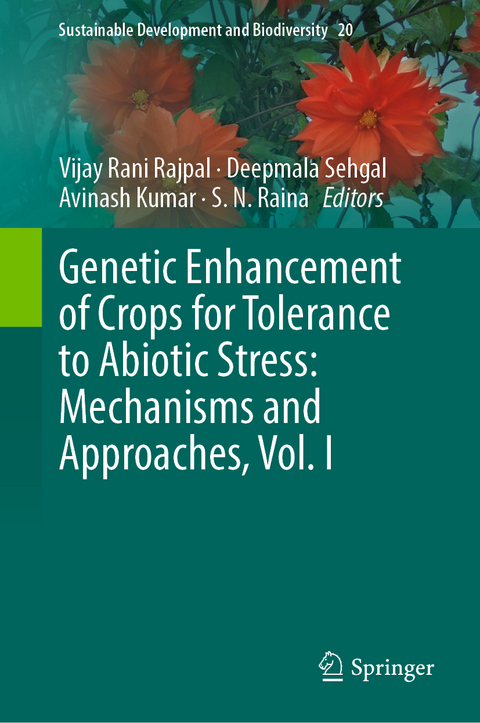
Genetic Enhancement of Crops for Tolerance to Abiotic Stress: Mechanisms and Approaches, Vol. I
Springer International Publishing (Verlag)
978-3-319-91955-3 (ISBN)
Abiotic stresses such as drought (water deficit), extreme temperatures (cold, frost and heat), salinity (sodicity) and mineral (metal and metalloid) toxicity limit productivity of crop plants worldwide and are big threats to global food security. With worsening climate change scenarios, these stresses will further increase in intensity and frequency. Improving tolerance to abiotic stresses, therefore, has become a major objective in crop breeding programs. A lot of research has been conducted on the regulatory mechanisms, signaling pathways governing these abiotic stresses, and cross talk among them in various model and non-model species. Also, various 'omics' platforms have been utilized to unravel the candidate genes underpinning various abiotic stresses, which have increased our understanding of the tolerance mechanisms at structural, physiological, transcriptional and molecular level. Further, a wealth of information has been generated on the role of chromatinassembly and its remodeling under stress and on the epigenetic dynamics via histones modifications.
The book consolidates outlooks, perspectives and updates on the research conducted by scientists in the abovementioned areas. The information covered in this book will therefore interest workers in all areas of plant sciences. The results presented on multiple crops will be useful to scientists in building strategies to counter these stresses in plants. In addition, students who are beginners in the areas of abiotic stress tolerance will find this book handy to clear their concepts and to get an update on the research conducted in various crops at one place
Preface.- Acknowledgements.- 1. Functional Genomics Approach Towards Dissecting out Abiotic Stress Tolerance Trait in Plants; Sneh L. Singla-Pareek.- 2. Plant miRNAome: Cross Talk in Abiotic Stressful Times; P. Suprasanna.- 3. Epigenetic Response of Plants to Abiotic Stress: Nature, Consequences and Applications in Breeding; Manoj. K. Dhar.- 4. Effect of Drought Stress and Utility of Transcriptomics in Identification of Drought Tolerance Mechanisms in Maize; T. Nepolean.- 5. Physiological and Molecular Basis of Abiotic Stress Tolerance in Wheat; H.M. Mamrutha.- 6. Molecular Chaperones: Key Players of Abiotic Stress Response in Plants; A. Pareek.- 7. Role of Chromatin Assembly and Remodeling in Water Stress Responses in Plants; N. Asharaf.- 8. The 'Omics' Approach for Crop Improvement Against Drought Stress; D. Jain.- 9. Genomic Strategies for Improving Abiotic Stress Tolerance in Crop Plants; N.R. Yadav.- 10. Genomics of Arsenic Stress Tolerance in Plants; P.K. Trivedi.- 11. Phytohormones Regulating the Master Regulators of CBF Dependent Cold Stress Signaling Pathway; R. Deswal.- Index.
| Erscheinungsdatum | 25.11.2018 |
|---|---|
| Reihe/Serie | Sustainable Development and Biodiversity |
| Zusatzinfo | XIII, 268 p. 34 illus., 27 illus. in color. |
| Verlagsort | Cham |
| Sprache | englisch |
| Maße | 155 x 235 mm |
| Gewicht | 590 g |
| Themenwelt | Naturwissenschaften ► Biologie ► Botanik |
| Schlagworte | abiotic stress • Functional mechanisms • Regulatory mechanisms • signalling pathways • Stress tolerance |
| ISBN-10 | 3-319-91955-5 / 3319919555 |
| ISBN-13 | 978-3-319-91955-3 / 9783319919553 |
| Zustand | Neuware |
| Haben Sie eine Frage zum Produkt? |
aus dem Bereich


